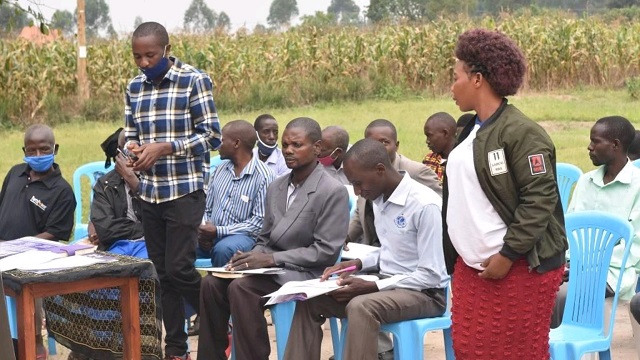
Kampala, Uganda | THE INDEPENDENT | Total Uganda is evaluating the residual land of the people affected by the East African Crude Oil Pipeline (EACOP) project in the ten districts within the pipeline route.
According to Stella Amony, the communications officer –Total E&P Uganda, has confirmed the exercise saying it commenced in November last year and will be concluded in March this year.
She says that the exercise is covering 296km from Hoima, Kikuube, Kakumiro, Kyankwanzi, Mubende, Gomba, Sembabule, Lwengo, Kyotera, and Rakai districts. Amony explains that the residual land evaluation is a process that had to be done after concluding the evaluation of the pipeline land.
Residual land means a small portion of land that remains after taking a bigger piece of land. Usually, this type of land makes no meaning to the owner and can hardly support any realistic project due to the tiny size. There have been a series of protests since 2019 over the alleged undervaluation of the Project Affected Persons’ (PAP) land, failure to consider the residual land and the delayed compensation.
However, Amony explains that the residual land was also considered for compensation only that the PAPs and other local leaders may not have received the information clearly. The exercise has however excited the PAPs in Rakai, Kyotera, Lwengo, Sembabule especially those with residual portions of land.
Birimuye Ssekyondwa, one of the PAPs in Nabigasa in Kyotera district explains that the valuation gives him hope that he will get fair compensation. He attributed the PAPs protests to lack of information from New Plan Ltd which Total contracted to implement the valuation process.
Veria Nanyonga, the Kanga LC1 in Betereemu parish in Nabigasa sub-county, says that considering her residual land will offer them an opportunity for fair compensation.
Betty Nabulya, another PAP in Betereemu village in Betereemu Parish says until they measure the land, she will remain skeptical. She adds that the exercise has started in Rakai and other areas unlike in Kyotera.
According to Edward Kamya Kabuye, the Rakai Deputy Chief Administrative Officer (CAO), the PAPs thought the government had disregarded compensation of the residual land leading to protests. Apart from the delayed compensation, undervaluation of property, the PAPs have also consistently complained over the residual land and demanded valuation and compensation for it.
Kabuye further explains that it is incumbent upon the government to compensate all the PAPs for their properties including the residual land. He adds that they do not want to leave any PAP at a loss since they willingly offered their land for the pipeline project. He says that it would not be realistic to get complaints when the project is completed yet they adding that they are trying to avoid litigation.
Moses Kasiita, the LCI Chairman for Kijjumba village and one of the PAPs in Lwanda sub-county says they are happy that government is considering their residual land for compensation even when the process has delayed.
*****
URN
 The Independent Uganda: You get the Truth we Pay the Price
The Independent Uganda: You get the Truth we Pay the Price



